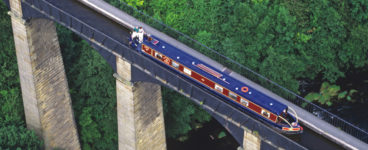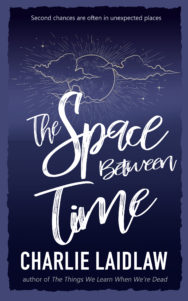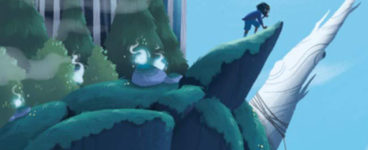‘I am a child of the sea, I sometimes think, and have done ever since we first moved to live beside it. I feel subject to its vagaries and tempers, with its foaming margins framed against a towering sky. I am familiar with its unchanging mood swings.’
What do think of when you think of stars? A-list celebrities or the immensity of the universe? Charlie Laidlaw’s latest novel combines family drama with different ways of being starstruck. Let BooksfromScotland introduce you to narrator, Emma Maria Rossini.
Extract taken from The Space Between Time
By Charlie Laidlaw
Published by Accent Press
Dad had looked pretty dead on the screen. The blood on his chest had looked pretty real. If it had been a different dead person, I would have been OK. Children don’t really know where make-believe ends and the real world begins and, partly because of who I am, it’s remained pretty hazy ever since. I also don’t like to remember that film because it was the moment when I realised that our lives were about to change, and I didn’t know if that would be a good thing.
Sounds strange, yes? Here’s something stranger: I am a child of the sea, I sometimes think, and have done ever since we first moved to live beside it. I feel subject to its vagaries and tempers, with its foaming margins framed against a towering sky. I am familiar with its unchanging mood swings. That’s how I like things; I find the familiar comforting. I find change threatening.
I am the daughter of someone who, not long after that ghastly cinema outing, became one of the most famous actors of his generation and, importantly for me, the granddaughter of a rather brilliant but obscure physics professor. But despite their overachievements, I have inherited no aptitude for mathematics and my father positively hated the idea of his only offspring following in his thespian footsteps. He knew how cruel and badly paid the profession could be. But I still look up to my grandfather, and think of his ludicrous moustache with affection.
Gramps once told me that there are more stars in the universe than grains of sand on Earth. Just think of all those sandpits, beaches and deserts! That’s an awful lot of stars. He then told me, his only grandchild, that I was his shining star, which was a nice thing to say and why I remember him talking about sand and stars. On clear nights, with stars twinkling, I often think about him.
I still believe in my grandfather, and admire his stoic acceptance in the face of professional disdain, because I believe in the unique power of ideas, right or wrong, and that it’s our thoughts that shape our existence. We are who we believe ourselves to be.
I gave up believing in my father long ago, because speaking other people’s words and ideas seemed like a lame excuse for a job, even if he was paid millions, and met the Queen on several occasions. She must have liked him because she awarded him an OBE for services to film, theatre and charity. Charity! Who the hell told the Queen that?
I stopped believing in him one Christmas Day, a long time ago, when he simply didn’t turn up. It wasn’t his presents that I missed, or even his presence, but the warm, fuzzy feeling of being important to him. During that day of absence and loss I concluded that his wife and daughter couldn’t much matter to him, otherwise he’d have made a bigger effort to get home. That Christmas Day, my father was simply somewhere else, probably in a bar, immaculately dressed, his hair slicked back, the object of male envy and the centre of every woman’s attention for miles around.
In that respect, Dad was more tomcat than father, except that by then his territory, his fame, stretched around the globe. I know this: by then he had a Golden Globe to prove it. He gushed pheromones from every pore, squirting attraction in every direction, and even women with a poor sense of smell could sniff him out.
I feel mostly Scottish, but am a little bit Italian. It explains my name, Emma Maria Rossini; my dark complexion, black hair, the slightly long nose, and thin and lanky body. Obese I am not, and will never be, however much pasta I eat, and I eat lots. It also explains my temper, according to some people, although I don’t agree with them, and my brown cow’s eyes, as an almost-boyfriend once described them, thinking he was paying me a compliment, before realising that he had just become an ex-almost-boyfriend.
But mostly I am a child of the sea. That’s what happens if you live for long enough by its margins: it becomes a part of you; its mood echoing your mood, until you know what it’s thinking, and it knows everything about you. That’s what it feels like when I contemplate its tensile strength and infinite capacity for change. On calm flat days in North Berwick, with small dinghies marooned on the glassy water, and loud children squealing in its shallows, it can make me anxious and cranky.
The sea, on those days, seems soulless and tired, bereft of spirit. But on wilder days, the beach deserted, or with only a hardy dog-walker venturing across the sand, with large waves thundering in, broaching and breaking, then greedily sucking back pebbles into the foam, I feel energised: this is what the sea enjoys, a roaring irresponsibility, and I share in its pleasure. We are all children of the sea, I sometimes think, or we should be – even those who have never seen an ocean or tasted its saltiness; I can stand for hours and contemplate its far horizons, lost within myself, sharing its passion. In the Firth of Forth is the ebb and flow of my past and my existence, wrapped tight against the west wind. It is what I am, placid and calm, or loud and brash.
I still hear the sea, the shush of waves and the screech of seabirds, in the Edinburgh flat where I now live. Children of the sea are like that; it’s in our blood, coursing through our veins; it reminds us where we came from, where we were born, and tells us without compassion that it will still be around long after we have gone.
The Space Between Time by Charlie Laidlaw is published by Accent Press, priced £8.99
ALSO IN THIS ISSUE

 World Heritage Canal: Thomas Telford and the Pontcysyllte Aqueduct
World Heritage Canal: Thomas Telford and the Pontcysyllte Aqueduct
‘We owe a great deal to Telford and others for creations that have stood the test of time, built wit …














